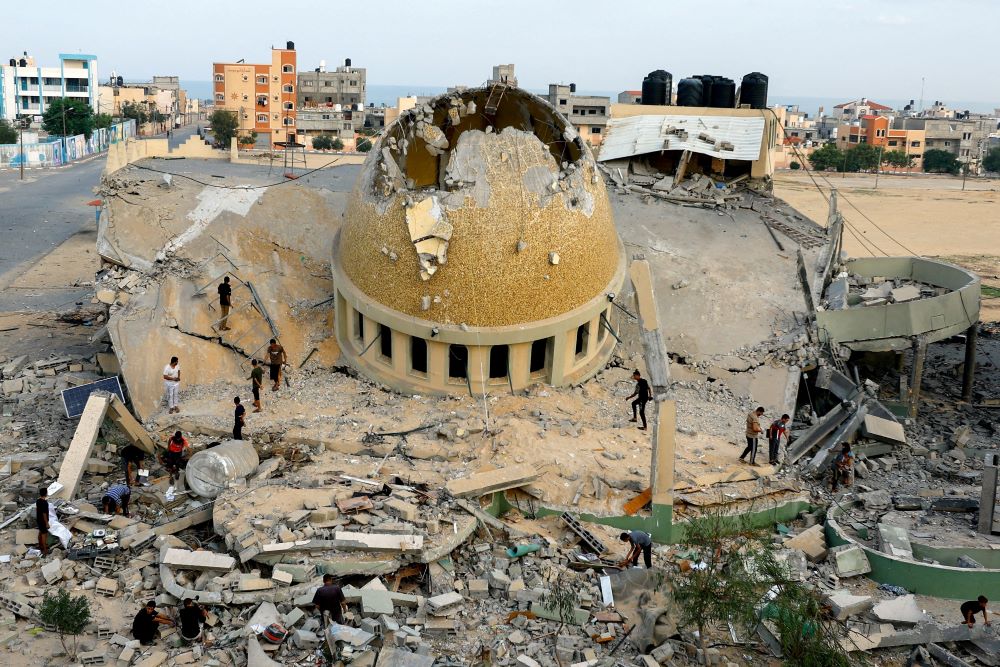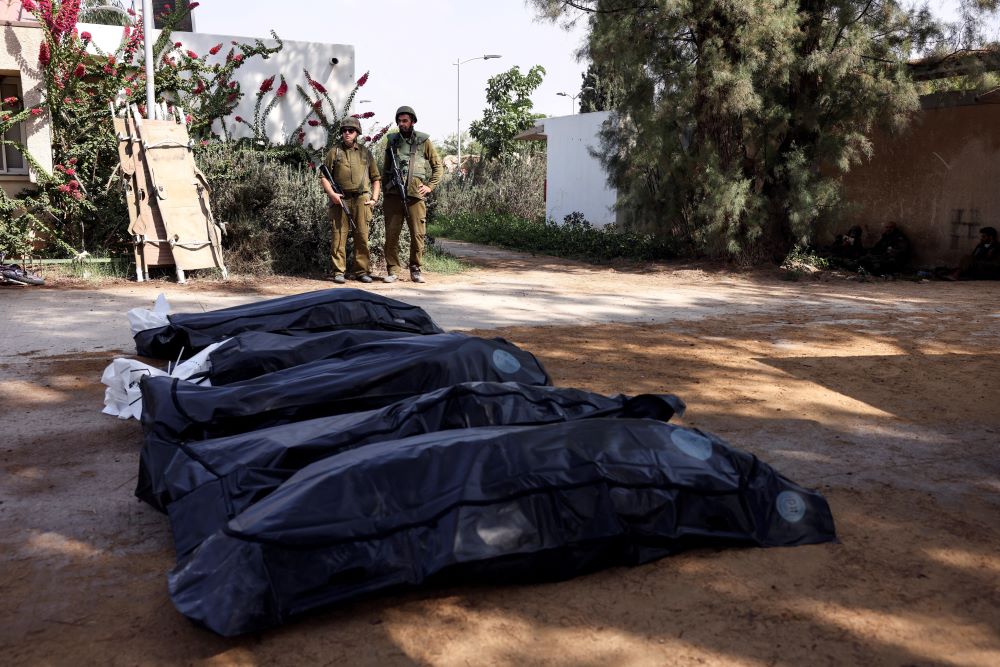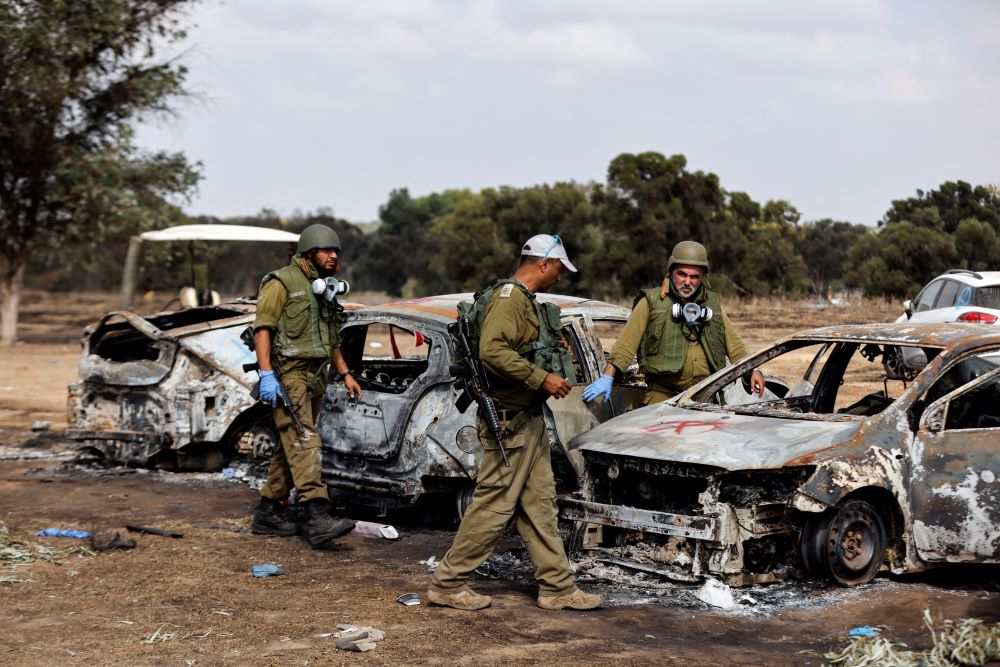
Palestinians inspect a mosque destroyed in Israeli strikes in Khan Younis, in the southern Gaza Strip, Oct. 8. (OSV News/Reuters/Ibraheem Abu Mustafa)
A Catholic sister living in the occupied West Bank is watching the unfolding crisis in Israel and Gaza with horror and dismay, calling the situation "horrendous" and hoping for a humanitarian corridor that could help the hundreds of thousands of Palestinians who are fleeing northern Gaza.
"People are going with donkeys and carts — that's how poor they are," the sister said. The Israeli government ordered that they leave so that Israeli forces can eliminate Hamas, the group that murdered some 1,400 Israeli civilians Oct. 7.
"Many are walking because they don't have a vehicle or it was destroyed in the bombings and some are even pushing loved ones in wheelchairs who are too weak to walk," said the sister. "What do you take with you from your home?"
Already, though, thousands of Palestinian Gazans have died in rocket shelling as Israel responds to the terrorist attacks. The situation in Gaza was dire before the latest war began, said the sister, who is not originally from the Middle East and does not want to be identified because of immediate security concerns.
Palestinian children wounded in Israeli strikes receive treatment at a hospital in Gaza City Oct.11. (OSV News/Reuters/Mohammed Salem)
"Gaza is not a country — it's really a city, one-quarter the size of London or 2 miles smaller than Seattle or Detroit," the sister said.
Gazans were already facing humanitarian challenges such as sketchy electrical access, overwhelmed medical care and unsafe drinking water.
"If you move people from the hospital, that could be a death sentence for them," said the sister.
Toward the end of an hourlong telephone interview on Oct. 16, the sound of an exploding rocket could be heard.
"I could feel the house shaking," she said of her West Bank residence. The bomb hit a location in Israel. "Up until a few minutes ago I wasn't concerned for my safety," she said, laughing nervously.
In a follow-up email, the sister said: "That bomb was many kilometers away from us and we felt it. How must the people feel every time all those bombs go off near them? Not only are they affected physically but also psychologically."
A key concern for her and other sisters working in the region is that about 1,300 Gazan Christians are seeking refuge in churches in the northern part of Gaza where Israel has ordered evacuations.
Meanwhile, she said, other Gazans are in hospitals and are "completely vulnerable. How do you move someone on dialysis or from the intensive care unit or even seriously ill babies in incubators?"
The sister added, "At what cost do lives have to be sacrificed? Once you cut off electricity, food and water, where is the humanity? Where is the love of God? We are all God's children. Jews and Muslims believe in a monotheistic God, the God of Abraham. It's very disheartening."

Israeli soldiers stand guard over bodies in Kfar Aza, a kibbutz in southern Israel, Oct. 10. The dead were victims of an Oct. 7 massacre carried out on the community by Hamas infiltrators.. (OSV News/Reuters/Ronen Zvulun)
The New York Times reported Oct. 17 that an Israeli airstrike hit a Gaza City hospital, killing hundreds, according to the Palestinian Health Ministry. The Times reported that civilians had sought shelter in the hospital. Israel later denied the allegation, saying the cause of the blast was a Palestinian group's mislaunched rocket, the Times reported. *
Church leaders in the region also decried the current crisis.
"Our beloved Holy Land has changed dramatically over the past week. We are witnessing a new cycle of violence with an unjustifiable attack against all civilians. Tensions continue to rise and more innocent and vulnerable people are paying the ultimate price as the dramatic level of death and destruction in Gaza clearly show," patriarchs and heads of churches based in Jerusalem said in an Oct. 13 statement.
They criticized Israel's initial order, which called for 1.1 million people to evacuate to Gaza's north within 24 hours. "Gaza's entire population is being deprived of electricity, water, fuel supplies, food, and medicine," the statement said.
The statement said that the United Nations believes that "423,000 people have already been displaced because of the destruction of their homes. Many civilians in Gaza have said to us that there are no realistic ways in which they can evacuate to safety in any direction."
The church leaders called upon the state of Israel "with the support of the international community, to allow humanitarian supplies to enter Gaza so that the thousands of innocent civilians may receive medical treatment and basic supplies. Moreover, we call upon all parties to deescalate this war in order to save innocent lives while still serving the cause of justice."
The comments echo humanitarian concerns from others, including from Baltimore-based Catholic Relief Services.
In an Oct. 15 statement, the humanitarian organization said it was "alarmed at the humanitarian crisis that is unfolding in Gaza," noting that nearly 1 million people, almost half of Gaza's population, "are at risk of displacement following an order for people to evacuate the northern part of Gaza. Prior to the order, over 400,000 Palestinians were already displaced. Many who are sick, disabled, injured, or otherwise vulnerable, are unable to comply with this order."

Israeli soldiers inspect the burned cars of festival-goers near Israel's border with the Gaza Strip, in southern Israel, Oct. 13, at the site of a Hamas attack on the Nova Festival. (OSV News/Reuters/Amir Cohen)
CRS called for "immediate humanitarian access before a dire humanitarian situation becomes a catastrophe.
"Electricity has been cut off, and critical supplies such as food, fuel and water are running dangerously low, and in some areas have run out completely," the statement said. "Most emergency shelters are beyond capacity and wastewater and sanitation services are overwhelmed, creating the conditions for a public health disaster. After days of intense shelling, hospitals are filled or over capacity with the injured."
Earlier, Fr. Gabriel Romanelli, the parish priest of Gaza's Holy Family parish, made similar comments. In an Oct. 11 interview posted by the Latin Patriarchate of Jerusalem, Romanelli said the church had welcomed residents fleeing "violent bombardment." At least four Christian families have lost homes, and at least 150 people are staying at the church, Romanelli said in the interview.
Meanwhile, 30 residents are staying at the St. Thomas Aquinas Center, and others are staying at the Holy Family School. He said three women's congregations — The Sisters of the Incarnate Word, Sisters of Charity and the Rosary sisters — "have also been helping by serving and assisting the families to the best of their abilities."
Asked about food, water and access to electrical power, he said the assembled people are facing a shortage of the first two and are "trying to divide the supplies among ourselves to sustain us as long as possible."
He added that electricity is limited, as is fuel.
"As everyone knows and sees through the news, due to the destruction and devastations left by the war, there are barely any supplies left, and they are mostly non-existent."
Advertisement
Romanelli confirmed that he and an assistant priest had spoken to Pope Francis, who had "assured us of his support and urged us to not cease in lifting our prayers to God Almighty and to continuously offer help to those in need."
"He said he would do his best to put an end to this horrific war," Romanelli said. "This has renewed our hope and faith that this war will end soon and has encouraged the parishioners upon knowing that Pope Francis has kindly contacted us."
Romanelli called for an end to the war now, and that the expected "post-war deterioration in the health sector and other systems will have a significant impact on our normal lives … (not) to mention the psychological effect, fear and disorders this war will leave on the people of Gaza. Many will suffer."
The sister interviewed by GSR said she and other sisters are keenly aware of the suffering that both Israelis and Palestinians have experienced since the Hamas attacks. U.S. President Joe Biden, who is planning to visit Israel Oct. 18, all while diplomats are working to ease the humanitarian crisis in Gaza.
The atrocities (against the Israelis) were horrendous," the sister said, a view shared by Palestinians she knows. But the sister said she and others working in the region say they are acutely aware that the current crisis has roots that predate the Oct. 7 attacks. She said Palestinians are frustrated and angry at what they see as international blindness and double standards about violations of Palestinian human rights. Israelis and supporters of Israel, though, make similar claims, about what they say is international bias against Israel.
The sister said that since Oct. 7, there have been some low-key public demonstrations, and that among groups trying to work across religious lines — Jewish, Muslim and Christian — there remains contact and commitment to continue the cause of peace and dialogue.
Romanelli, the Gaza parish priest, joined with other church leaders, called for people to dedicate Oct. 17 to "fasting, abstinence, and intercession to cry out to God to end this war and bring about peace."
The sister interviewed by GSR noted the same designation. "I really believe in the power of prayer," she said, adding, "I feel there is hope," as she and other sisters she works with are feeling more sadness for the situation than outright despair. "The only thing that keeps us going is our faith in God."
*This story has been updated with more information on a rocket blast.







